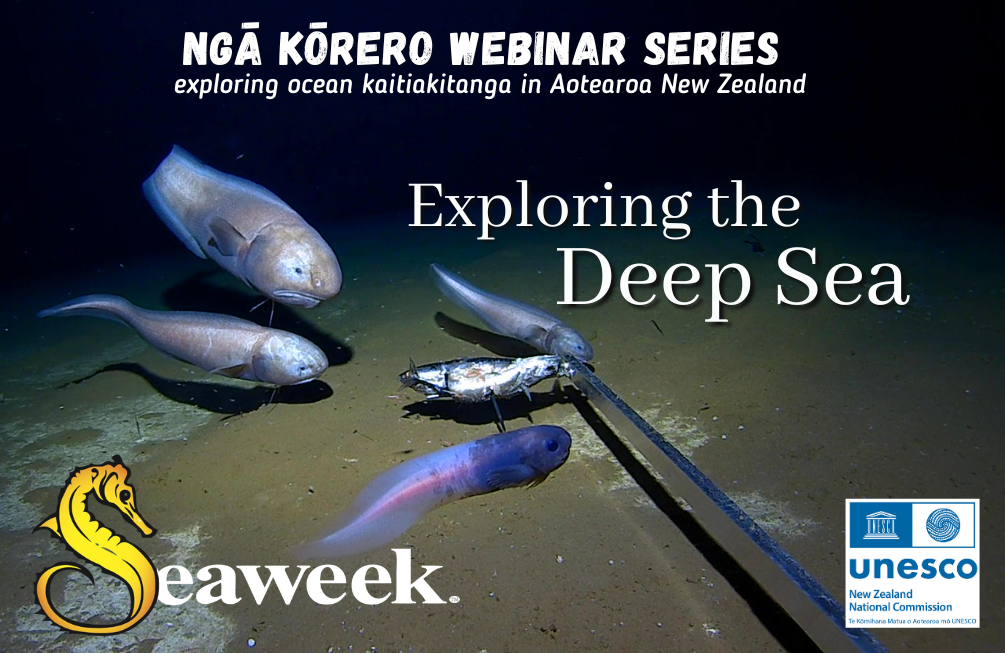
Check out the Exploring the Deep Sea Webinar Recording
This webinar dives into New Zealand’s deep-sea ecosystems! This fascinating webinar will leave you in awe and wonder, and it's full of great facts and good humour. Check out the summary below or jump straight into the recording.
Many thanks to the three talented scientists which were guest speakers at this online event; Ryan Howard, Dr. Thom Linley, and Dr. Kat Bolstad. The panel shared their understanding of how the deep sea supports unique marine species and communities - and they provided some really interesting visuals and videos too.
The Depths of the Sea
To give an overview and lay the foundation of what characterises the deep sea, we had Ryan Howard, a PhD Candidate at AUT Lab for Cephalopod Ecology & Systematics. Ryan studies sensory ecology and how deep-sea squids use their vision in the dark open ocean. In his presentation, he touched on some noteworthy events in deep-sea exploration history and introduced the key differences in the layers as you descend deeper into the ocean. From introducing bioluminescence and marine snow (decaying material falling from the upper layers), Ryan’s presentation provided a great foundation for the next speakers.
How to be a Deep Sea Fish
Our second guest speaker was Dr. Thom Linley, deep sea fish specialist and Curator of Fishes at Museum of New Zealand, Te Papa Tongarewa. Thom is very knowledgeable on the topic of deep-sea demersal fishes (living close to the bottom) from 4000 m depth and deeper. Thom’s presentation covered some of the special adaptations and features of deep-sea fishes which help them survive in the extreme high-pressure environment which comprises most of our planet. Their primarily gelatinous bodies supported by the surrounding water, and long whip-like tails, plus their slow movements to conserve energy are just some of the aspects that enable them to survive in such a complex environment.
Deep Sea Squid
Our final presentation was by Dr. Kathrin Bolstad, squid specialist and Deputy Head of Ecology at AUT Lab for Cephalopod Ecology & Systematics. Her presentation focused on our current understanding of giant and colossal squid and what is still unknown about these incredible species. Kat shared that giant squid (Archteuthis dux) are the world’s longest squid at up to 13m, and colossal squid (Mesonychoteuthis hamiltoni) are the heaviest squid species at up to 500kg. While difficult to observe due to their deep-water range, current research has indicated that between 4 million, at a conservative estimate and 319 million giant squid are consumed by sperm whales annually!
You can learn lots more from listening to the recording and visiting the links below. Ngā Kōrero is a free webinar series brought to you by Seaweek with support from the NZ National Commission for UNESCO. Be sure to check out seaweek.org.nz and join our email list to hear about future webinars and opportunities to engage with us.
For more information, check out these links:
The Deep Sea Podcast: armausoceanic.com/podcast or youtube.com/@deepsea_podcast
The official website of the AUT Lab for Cephalopod Ecology & Systematics: aut.ac.nz/study/study-options/science/facilities/lab-for-cephalopod-ecology-and-systematics
Ryan Howard: twitter.com/AbyssalAquanaut
Dr. Thom Linley: twitter.com/ThomLinley
AUT Lab for Cephalopod Ecology & Systematics: twitter.com/ALCESonline
The Deep Sea Conservation Coalition savethehighseas.org